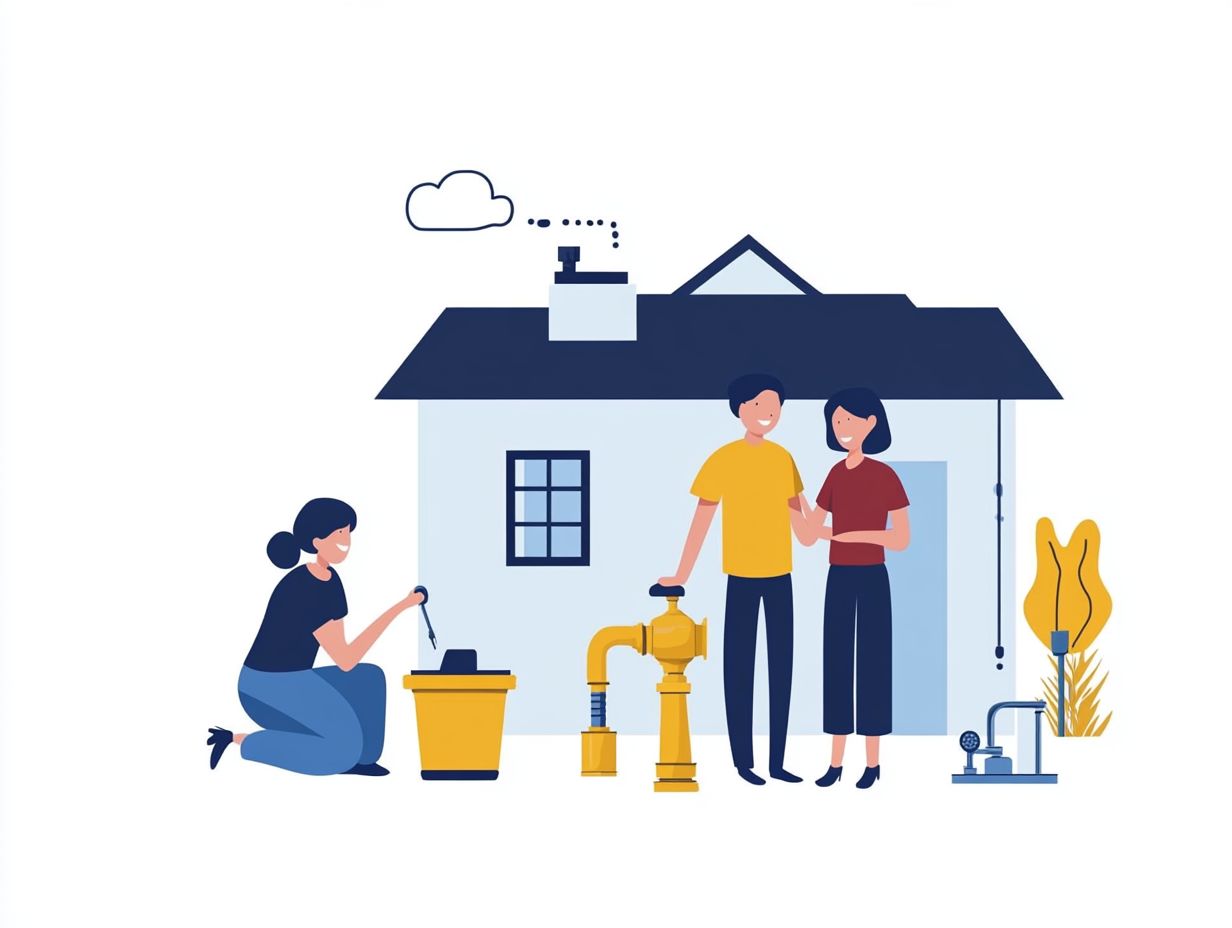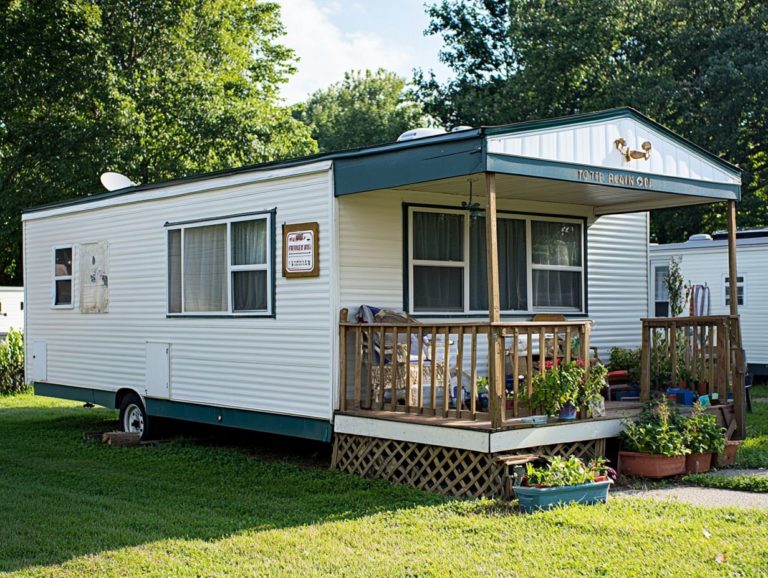What is a Home Warranty vs Home Insurance?
Safeguarding your home means understanding the crucial differences between home warranties and home insurance.
Though both provide essential coverage, they serve different needs and situations. This article delves into the nuances of home warranties versus home insurance, outlining the specific protections each offers and highlighting their key differences. You ll also discover the advantages of having both for a well-rounded safety net.
Plus, we ll provide tips for selecting the right options tailored to your unique requirements.
Contents
Key Takeaways:

Home warranties cover essential systems and appliances. In contrast, home insurance protects against unexpected events like fires or storms.
Home warranties provide specific, limited coverage for repairs and replacements, while home insurance offers broader coverage for property damage and liability.
Having both a home warranty and home insurance can give you comprehensive protection and peace of mind as a homeowner. Carefully consider coverage and compare options before choosing a plan.
Understanding Home Warranties
Home warranties offer financial protection against appliance breakdowns. They act as service contracts covering major systems like heating, ventilation, and air conditioning (HVAC), plumbing, and electrical components.
These warranties help reduce the anxiety of unexpected repair expenses, giving you the confidence to handle whatever comes your way.
Definition and Coverage
A home warranty is a service agreement that offers coverage for the repair or replacement of damaged systems and appliances within your home.
This type of warranty typically covers a range of household items, including water heaters, kitchen appliances, and heating and cooling systems. You can select plans tailored to your specific needs, ensuring that your vital appliances receive the protection they deserve.
Unlike homeowners insurance, which primarily addresses damage caused by external factors like fire or theft, a home warranty focuses specifically on the everyday wear and tear of essential home systems.
By understanding how these service agreements work, you can gain peace of mind and safeguard yourself against unexpected repair costs.
Understanding Home Insurance
Home insurance protects you from damage and liability. It covers your home, personal belongings, and even extra living expenses during repairs, ensuring your investment remains secure against unforeseen events like natural disasters or structural issues.
Typically, homeowners insurance encompasses various elements, including coverage for the home s structure and liability claims, providing a comprehensive safety net.
Definition and Coverage

Homeowners insurance is your shield against life’s unpredictability, designed to protect you from damages to your property and belongings.
This invaluable coverage typically encompasses a wide range of incidents, including structural damage from natural disasters like hurricanes, floods, and wildfires, as well as theft and vandalism.
It ensures that you can replace essential items think furniture, electronics, and clothing if disaster strikes.
Understanding the claims process is paramount; when calamity occurs, knowing how to navigate the claims efficiently will help you receive your compensation without unnecessary delays.
Ultimately, having comprehensive insurance coverage not only offers you financial protection but also grants you peace of mind, allowing you to focus on living your life rather than worrying about potential losses.
Differences Between Home Warranties and Homeowner’s Insurance
While both home warranties and homeowner’s insurance offer essential safeguards, it s vital to recognize the key differences in their coverage areas and limitations, crucial for managing your home effectively.
A home warranty focuses on the repair or replacement of major appliances and home systems. It provides a service agreement that typically involves the amount you pay when you make a claim.
Homeowner’s insurance protects against broader risks, including natural disasters, liability, and structural damage. Understanding these distinctions is key when selecting the right protection plan for your needs.
Coverage Areas and Limitations
The coverage areas and limitations of home warranties and homeowner’s insurance can vary significantly, directly influencing the financial protection you receive.
Home warranties generally cover major systems and appliances, such as plumbing, electrical systems, and heating or cooling units. This means you can enjoy peace of mind when these essential elements fail unexpectedly. However, be aware that they often exclude issues from improper maintenance or pre-existing conditions, which can leave you vulnerable.
Homeowner’s insurance also protects you against property damage and liability claims, addressing incidents like theft, fire, and specific natural disasters. Keep in mind that many policies don’t cover floods or earthquakes, which can surprise homeowners.
Understanding these limitations is essential for making informed decisions about your financial safety and effectively managing risk.
Benefits of Having Both Home Warranty and Homeowner’s Insurance
Get both a home warranty and homeowner’s insurance to boost your protection and safeguard your investment today!
Homeowner’s insurance serves as your shield against significant risks, like natural disasters and liabilities, while a home warranty takes care of repair costs for major appliances and home systems. This combination alleviates the financial strain from unexpected events.
By adopting this dual approach, you ensure that you re not just protected from structural damage but also covered for any appliance failures, creating a robust safety net for your home.
Comprehensive Protection and Peace of Mind

The combination of comprehensive protection from both a home warranty and homeowner’s insurance provides you with unparalleled peace of mind against a wide array of unexpected events. This dual-layered security significantly alleviates financial burdens during times of crisis.
While homeowner’s insurance typically covers damages from natural disasters like fires or storms, a home warranty steps in to take care of essential appliance repairs or replacements, like a broken air conditioning unit or a malfunctioning water heater.
Picture this: a severe storm damages your roof. Your homeowner’s insurance covers the repair costs, while your home warranty addresses any appliance issues from the resulting water damage.
This synergy enhances the overall safety of homeownership and protects you from the unpredictable nature of accidents and the wear and tear of everyday life.
How to Choose the Best Home Warranty and Homeowner’s Insurance for You
Choose the right home warranty and homeowner’s insurance to protect your home and peace of mind.
This decision requires thoughtful consideration of several factors, including coverage options, service fees, and the reputation of your chosen insurance provider.
Take the time to assess your specific needs consider the age of your appliances and the likelihood of natural disasters in your area to make well-informed choices.
By comparing different policies, grasping the claims process, and evaluating additional benefits, you can greatly enhance the effectiveness of your coverage.
Summary
Having both a home warranty and homeowner’s insurance is essential for comprehensive coverage and peace of mind. Understanding the differences in their coverage and limitations helps you make informed decisions to protect your investment effectively.
Factors to Consider and Comparison Tips
Choosing between home warranty plans and homeowners insurance? Consider key factors to find the coverage that fits your needs perfectly!
Know the details of service fees and coverage exclusions. Understand what your home’s condition means for your protection.
For instance, home warranties typically cover repairs for appliances and systems like HVAC, plumbing, and electrical work. On the other hand, homeowners insurance protects against damage from unforeseen events such as fire or theft.
To simplify your selection process, it s wise to compare multiple providers. Pay close attention to customer reviews and the specifics of the service contracts.
By doing so, you can pinpoint the optimal combination of coverage that addresses both your immediate and long-term needs, ensuring a sense of security and peace of mind.
Frequently Asked Questions
What is a Home Warranty vs Home Insurance?

A home warranty is a service contract that covers the repair or replacement of major home systems and appliances due to normal wear and tear. Home insurance, on the other hand, covers damages to the structure of your home and your personal belongings due to unexpected events like fire, theft, or natural disasters.
Do I need both a home warranty and home insurance?
It’s not required to have both a home warranty and home insurance, but it’s a smart choice to do so for full coverage. A home warranty adds protection for your appliances and systems, while home insurance covers unexpected damages to your home and personal property.
What does a home warranty cover?
A home warranty typically covers major home systems like HVAC, plumbing, and electrical, as well as major appliances such as refrigerators, ovens, and washers/dryers. Coverage varies depending on the specific plan and provider.
What does home insurance cover?
Home insurance covers damages to the physical structure of your home, including the roof, walls, and foundation, as well as your personal belongings. It may also provide liability coverage for accidents that occur on your property.
How do I file a claim with a home warranty?
If a covered appliance or system breaks down, contact your home warranty provider to initiate a claim. They will send a qualified technician to assess the issue and determine if it s covered under your plan. You may be responsible for a service fee.
How do I file a claim with home insurance?
In the event of a covered loss, file a claim with your home insurance provider by contacting them directly or through their website. They will assign an adjuster to assess the damages and determine the coverage amount. You may have to pay a deductible before receiving your payout.






